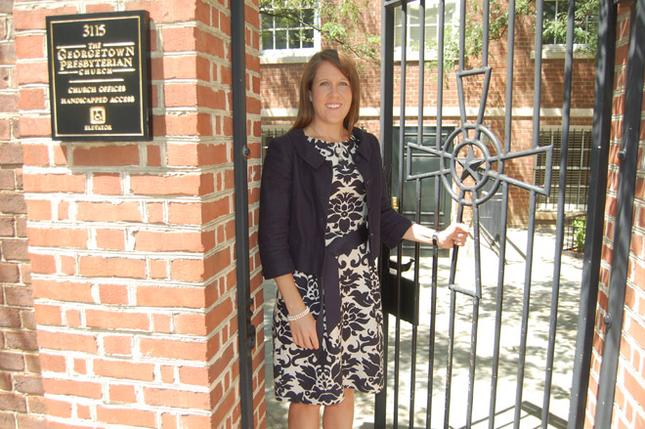Breath of Fresh Air: Pastor Camille Cook Murray
By • April 10, 2013 0 2981

To some minds, Easter seems like an easy sermon for any Christian minister, priest or even motivational speaker. This particular Sunday is rich with the resonant metaphors and reality of resurrection, of rising again.
Still, so rich a palate could present a challenge for the making of sermons. You wonder how the Reverend Camille Cook Murray at the Georgetown Presbyterian Church will deal with it at a time when not just Catholics but Presbyterians and the whole denominational spectrum of Christendom and the community of faith rejoice in Easter–along with the arrival of a new pope–in perilous times.
You can guess that the Rev. Murray, who has rejuvenated one of Washington’s oldest religious communities and congregations with her youth, intelligence and connectivity since becoming its pastor in 2010 will find ways to bring in heaven and earth and stories, communities both celestial and just around the corner.
“In scripture, we find that the apostles were told that the tomb was open, and they ran to the tomb, because they wanted to see for themselves,” Murray said. “And this is what we must do with faith in our time—we can’t simply adopt it because our parents or our grandparents did. It is something we must come to see, discover, feel and live for ourselves. I am calling my sermon, ‘Seeing for Myself.’ “
Since her arrival in 2010, the church and Murray herself (her maiden name is Cook) have been blessed with major and positive changes. Her youthful presence—she is 31-years-old but looks younger—and her outward looking, embracing vision matched to an impressive intellect and resume—have buoyed the historic and venerable congregation to a notable increase in membership, many of them skewing younger. Murray herself had a notable change in her life: she married Scotsman Roddy Murray the summer of 2012, and they now own a house in Georgetown.
I suspect talking theology with Murray would be both stimulating and challenging because as senior pastor, she’s seems both obviously spiritual and grounded, philosophical and pragmatic. She is passionate about running and reminds you that she ran in the recent Rock and Roll marathon. “Three hours, 54 minutes,” she says emphatically.
The healthy athleticism probably stems from growing up in Minnesota with three brothers. The outward-reaching aspects of her vision probably comes from her parents—her father came from a Presbyterian family, her mother’s was Roman Catholic. She studied medicine at Vanderbilt University, changed her major and life and enrolled in the Princeton Theological Seminary. She spent time at the Madison Avenue Presbyterian Church in New York, had a year at Oxford University and after being ordained was appointed associate minister at St. Columba’s Church in London in 2007.
Her professional story line is impressive, but it’s her vision that must have been just as telling to others. Last year, at Eastertide, she outlined her vision to the congregation which included this: “I imagine our church being a place for its people to see God, minister to each other and reach out to others in the world.”
Georgetown Presbyterian Church dates back to 1780, and venerable is a good word for the solid church at 3115 P St., NW. But if you should take in a Sunday service as we did last summer, you note that how the venerable is part of a seamless tapestry not just of history but of the present. Sitting in the back, you notice the presence of numerous young children, who are restless with the spirit of just being there and you see former public officials, including an attorney general, a secretary of defense, a national security adviser.
“This is part of the history of this congregation, that it’s members believe in service and live a life of service,” Murray said.
Just from reading a series of titles of her sermons, it’s hard not to see that you are entering territory that claims the transcendent and the prosaic as kin. That kinship provides both energy and solace. It can call you home. Or, in the case of Pastor Murray, it can breathe new life into a church that she makes feel like home.

